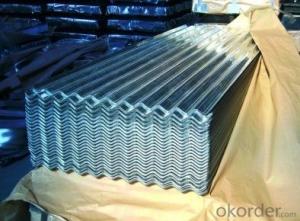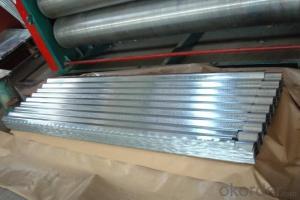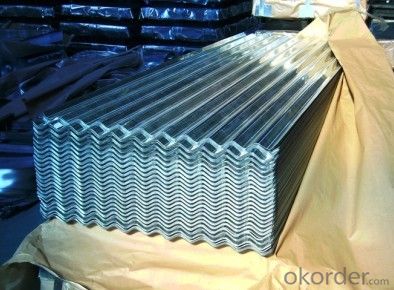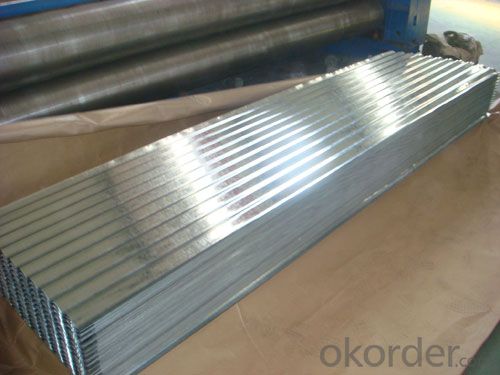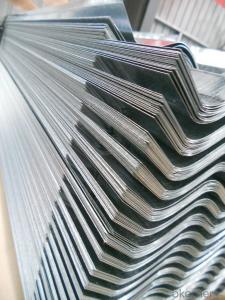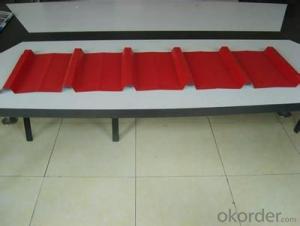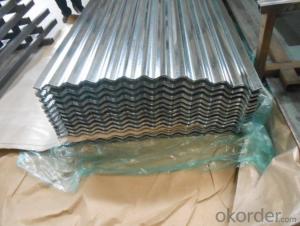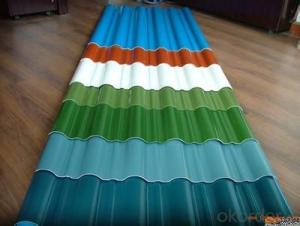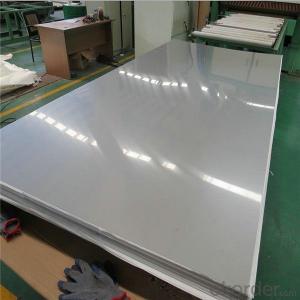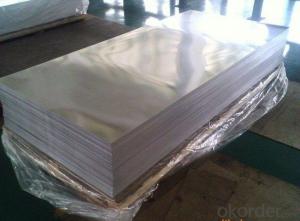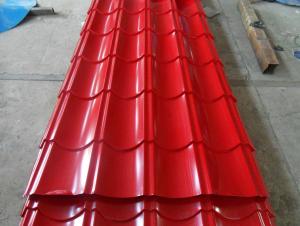GALVANIZED STEEL CORRUGATED SHEETS
- Loading Port:
- Tianjin
- Payment Terms:
- TT OR LC
- Min Order Qty:
- -
- Supply Capability:
- 10000 m.t./month
OKorder Service Pledge
OKorder Financial Service
You Might Also Like
GALVANIZED STEEL CORRUGATED SHEETS
THICKNESS:0.20mm
WIDTH:800mm(AFTER CORRUGATION)
LENGTH:1828mm
ZINC COATING:60g/m2
STANDARD:JIS G 3302, SGCH (HARD QUALITY:75HRB-90HRB)
SURFACE:REGULAR SPANGLE, CHROMATED, DRY
PACKAGE WEIGHT:ABOUT 3 TONS
PAYMENT TERM:30% TT advance,70% against BL copy OR 100% LC AT SIGHT.
SHIPMENT: WITHIN 35 DAYS AFTER RECEIVING THE DEPOSIT.
DOUCUMENTS:COMMERCIAL INVOICE IN THREE ORIGINAL,PACKING LIST IN ONE ORIGINAL AND SPECIFICATION,CERTIFICATE OF ORIGIN.
ORIGIN:MADE IN CHINA
LABEL INFORMATION:AS REQUEST.
PORT OF LOADING: XINGANG PORT, CHINA
- Q: What is the minimum thickness of a steel sheet?
- The minimum thickness of a steel sheet can vary depending on the specific grade and type of steel being used, but it typically ranges from around 0.5 millimeters to 2 millimeters.
- Q: Can steel sheets be used for fencing or security purposes?
- Yes, steel sheets can be used for fencing or security purposes. Steel sheets provide strong and durable barriers, making them suitable for fencing applications to protect properties or secure areas. Additionally, their robustness and resistance to impact make them ideal for enhancing security by preventing unauthorized access.
- Q: Are steel sheets suitable for automotive body panels?
- Yes, steel sheets are suitable for automotive body panels. Steel is a widely used material in the automotive industry due to its high strength and durability. Steel sheets can withstand the stresses and strains encountered by body panels during vehicle operation, such as impacts, vibrations, and weather conditions. Furthermore, steel can be easily formed into complex shapes, making it an ideal choice for designing various body panel components. Additionally, steel has excellent corrosion resistance properties when properly treated and coated, ensuring the longevity and aesthetics of the vehicle. Overall, steel sheets provide the necessary characteristics required for automotive body panels, making them a suitable choice for manufacturers.
- Q: How do steel sheets perform in high-temperature environments?
- Steel sheets perform well in high-temperature environments due to their excellent heat resistance properties. They have a high melting point and can withstand extreme temperatures without losing their structural integrity or mechanical properties. Additionally, steel sheets have good thermal conductivity, allowing them to efficiently transfer heat away from the surface, preventing overheating and maintaining stability even under prolonged exposure to high temperatures.
- Q: Are steel sheets resistant to impact or puncture?
- Yes, steel sheets are highly resistant to both impact and puncture due to their inherent strength and durability.
- Q: What are the different surface finishes for stainless steel sheets?
- Some of the different surface finishes for stainless steel sheets include brushed, mirror, satin, and bead blasted finishes.
- Q: How do steel sheets perform in terms of wear resistance?
- In terms of wear resistance, steel sheets exhibit impressive performance. Renowned for their strength and durability, steel is well-known for these attributes, and steel sheets are equally exceptional. They possess the capability to endure substantial loads, abrasion, and impact, rendering them highly suitable for various applications where wear resistance is of utmost importance. Moreover, the wear resistance of steel sheets can be further augmented through the utilization of surface treatments or coatings. In summary, steel sheets are extensively favored in industries necessitating materials capable of enduring wear and tear for prolonged durations.
- Q: How do you prevent rust on steel sheets?
- To prevent rust on steel sheets, it is essential to apply a protective coating such as paint or a corrosion-resistant finish. Additionally, keeping the steel sheets dry and avoiding exposure to moisture and humidity can significantly reduce the chances of rust formation. Regular cleaning and maintenance, including the removal of any existing rust, also help in preventing its further spread and maintaining the steel sheets' integrity.
- Q: Are steel sheets suitable for modular construction?
- Yes, steel sheets are suitable for modular construction. They are lightweight, durable, and have high strength-to-weight ratio, making them ideal for constructing modular buildings. Steel sheets can be easily fabricated and assembled into modular components, providing flexibility and ease of construction. Additionally, steel is resistant to fire, pests, and weathering, ensuring longevity and safety in modular structures.
- Q: Can the steel sheets be easily drilled for fastening purposes?
- Drilling steel sheets for fastening purposes? Absolutely possible! Steel is renowned for its strength and durability, yet it remains relatively easy to work with when it comes to drilling. By employing the correct tools and techniques, you can effortlessly create holes in steel sheets to attach brackets, screws, or nails. Nevertheless, it's crucial to employ drill bits specifically designed for metal drilling. Moreover, during the drilling process, it might be necessary to utilize lubricants or cooling agents to prevent overheating and potential damage to the drill bit. Although drilling through steel sheets demands additional effort and careful handling, rest assured, it can be accomplished successfully for fastening purposes.
Send your message to us
GALVANIZED STEEL CORRUGATED SHEETS
- Loading Port:
- Tianjin
- Payment Terms:
- TT OR LC
- Min Order Qty:
- -
- Supply Capability:
- 10000 m.t./month
OKorder Service Pledge
OKorder Financial Service
Similar products
Hot products
Hot Searches
Related keywords
